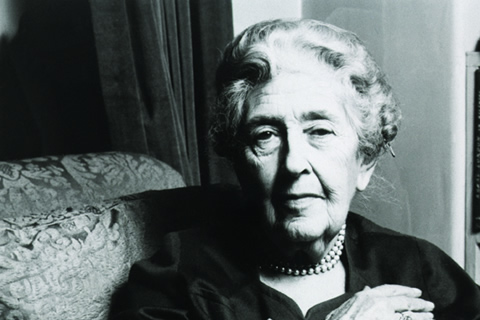Agatha Christie, English literature’s “Queen of Crime,” may have succumbed to Alzheimer’s disease in her later years. It was never diagnosed by doctors, but now two U of T professors say that a trail of evidence left in her published work leads suspiciously in that direction.
One of the most important writers in the mystery genre, Christie wrote some 80 detective novels during her 53-year career. She is, according to Guinness World Records, the bestselling fiction author of all time; only Shakespeare and the Bible have outsold her.
But was something amiss toward the end? Avid Christie fans had the unsettling feeling that there might have been: the plot wasn’t as tight, the mystery not as carefully conceived. In 2004, the English academic Peter Garrard argued that evidence of Iris Murdoch’s Alzheimer’s disease appeared in her written work even before her doctor diagnosed it. So Ian Lancashire, an English professor at the University of Toronto, decided to analyze a selection of Christie’s novels.
He teamed up with Graeme Hirst, a professor in the computer science department. After digitizing copies of the books and developing their own analytical software, they examined the first 50,000 words of 16 of Christie’s novels. The earliest one, The Mysterious Affair at Styles, was written at the beginning of her career, when she was in her mid-twenties. The last one, Postern of Fate, was penned when she was 82. She died at 85 of natural causes.
The researchers looked at three aspects of Christie’s writing. First, they assessed the richness of her vocabulary by literally counting the number of different words she used. Next, they counted the number of repeated phrases. Last, they identified how often she relied on indefinite words, such as “thing,” “anything” and “something,” among others, rather than more specific ones.
Lancashire and Hirst found that the richness of Christie’s vocabulary fell by one-fifth between the earliest two works and the final two works. They note that her second-last novel, Elephants Can Remember, written when she was 81, shows a “staggering drop in vocabulary,” down 31 per cent from just 18 years earlier, when she wrote Destination Unknown. “I was shocked,” says Lancashire.
The use of repeated phrases also increased significantly between early and late works, as did Christie’s use of indefinite words. These changes are consistent not with normal aging but with Alzheimer’s disease, says Regina Jokel, a U of T professor of speech-language pathology, who is a member of Lancashire’s team.
The researchers are now extending their analysis of Christie, and will study P.D. James as a healthy control. They believe that someday the technique might allow us to spot early signs of Alzheimer’s not just in novelists, but in any of us – through our emailing, blogging and tweeting.
Recent Posts
U of T’s Feminist Sports Club Is Here to Bend the Rules
The group invites non-athletes to try their hand at games like dodgeball and basketball in a fun – and distinctly supportive – atmosphere
From Mental Health Studies to Michelin Guide
U of T Scarborough alum Ambica Jain’s unexpected path to restaurant success
A Blueprint for Global Prosperity
Researchers across U of T are banding together to help the United Nations meet its 17 sustainable development goals






